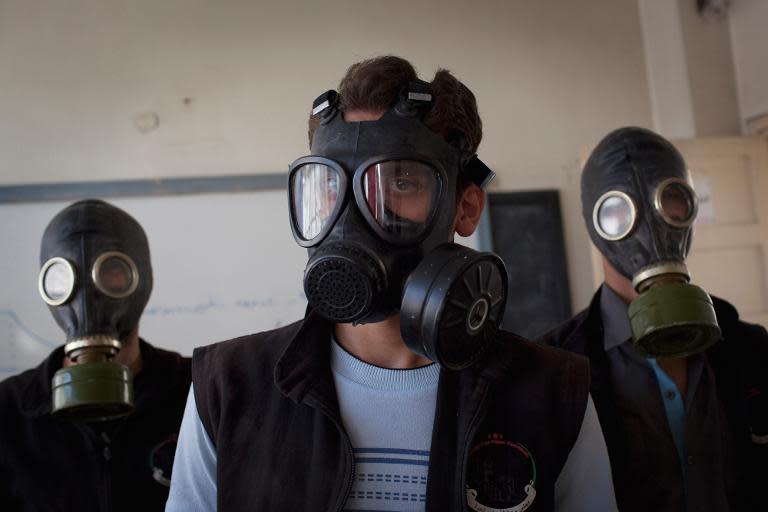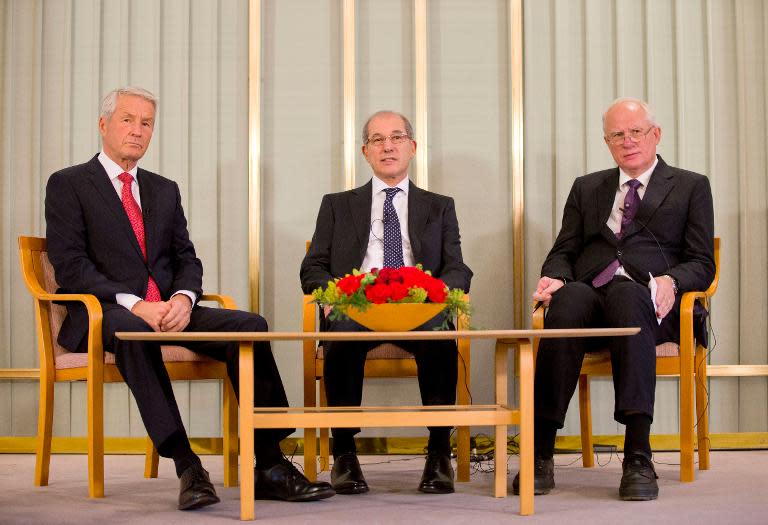Watchdog hopes Nobel prize will speed up chemical arms ban
Oslo (AFP) - The world's chemical watchdog picks up this year's Nobel Peace Prize in Oslo on Tuesday, hoping to speed up the global eradication of chemical arms.
Eliminating the weapons is "a noble cause and I see no reason for any country to do otherwise," the director general of the Organisation for the Prohibition of Chemical Weapons (OPCW), Ahmet Uzumcu, said Monday.
The watchdog is a rare example of successful global disarmament, but it has yet to declare its mission accomplished.
"Hopefully in the near future we will be able to do away with a whole category of weapons, chemical weapons," the chairman of the Norwegian Nobel Committee, Thorbjoern Jagland, said Monday.
A global ban on the production and storage of chemical weapons came into force in 1997, and 190 nations have signed the Chemical Weapons Convention.
They account for more than 98 percent of the world population, and more than 80 percent of all declared chemical weapons have been destroyed -- but six states remain to be persuaded.
Israel and Myanmar have signed the convention but not ratified it, while Angola, Egypt, North Korea and South Sudan have failed to do either.
"Among those six countries, we know that some of them are very close to membership," Uzumcu said.
"I sincerely hope (the others) will reconsider and join this chemical weapons convention," he added.
The United States and Russia have both pledged to scrap their chemical weapons, but failed to meet a 2012 deadline to do so.
The decision to hand the award to the OPCW cast the spotlight on an organisation that was previously, by its own admission, little known outside diplomatic circles.
"It used to be the OPC... who? Now everybody knows the OPCW," Malik Ellahi, a special advisor to Uzumcu, told AFP last week.
It comes at a time when the body faces its most logistically challenging task ever, in Syria, which became a member in October.
The move averted strikes by US-led forces after a nerve gas attack that killed hundreds on the outskirts of Damascus on August 21.
A roadmap adopted last month by the OPCW to rid Syria of its chemical stockpile says "priority" weapons must be removed from the country by December 31.
"This is very challenging, especially in view of the security situation which is worsening in this country," Uzumcu said.
"The opposition has been, in general, cooperative throughout our inspections; so has the government. We are pleased about the constructive approach by all parties in Syria so far," he added.
The Syrian weapons are to be destroyed aboard the US Navy's MV Cape Ray, a 200-metre (650-foot) cargo ship equipped with two hydrolysis systems.
Hydrolysis involves breaking down a lethal chemical agent such as mustard gas with hot water and other compounds, which results in a sludge equivalent to industrial toxic waste.
But to be shipped out of the country, Syria's chemical arms must be transported through a war zone to the Mediterranean port of Latakia.
"In view of the circumstances in this country, it will be quite difficult to meet this timeline but we hoped that this operation can start soon," Uzumcu said.
The Nobel prize consists of a gold medal, a diploma and eight million Swedish kronor ($1.2 million, 898,000 euros), which the organisation will use for an annual award of its own.
"Of course, we are not going to compete with the Nobel Peace Prize. It's going to be a modest prize just to recognise those who contribute to our goals," Uzumcu said.
The Nobel prizes in literature, chemistry, physics, medicine and economics will be awarded in Stockholm on Tuesday.


